- Home
- Amy Harmon
Slow Dance in Purgatory Page 3
Slow Dance in Purgatory Read online
Page 3
"But…" Maggie stuttered and then stopped. Had she done more than she thought? Or maybe the person she'd seen had felt badly that he had scared her and finished for her. No. That was just plain weird. But she didn't have another answer.
Gus was already walking back toward her bucket and mop, and Shad was probably already down the stairs. Maggie didn't wait around to ponder the mystery further. There was no way she was staying in that hallway one more minute. She helped Gus return the bucket and mop to the third floor maintenance closet, and they left the school without saying anything more about Maggie's intruder. Gus tossed her bike into the back of his rickety truck, and the three of them filed into the cab and headed to Maggie's house where dinner was surely waiting.
It wasn't until later that night, as Maggie drifted off to sleep, that she remembered the music. There was no music playing anywhere else in the school when she had run from the hallway. There was no music playing when she returned with Gus. After that, it took Maggie a very long time to fall asleep.
***
The day after Maggie’s parents died, she’d seen her mother standing beside her bed, looking down at her. For a moment, she had even felt her mother’s hand in her hair, and she forgot that she was alone in the world, that her parents were gone. It had been only for a second, but Maggie had not been asleep. She had immediately run out into the hallway and down into the room where her parent’s friends were huddled with coffee, deciding what to do with her. Nobody believed her when she told them she had seen her mom.
About two weeks after she’d been placed in her second foster home, Maggie had seen a little boy playing with miniature cars on the rug in her “new” room. She had mentioned it to her foster mother, asking her who the little boy was. The woman had locked herself in her room for the rest of the day, and though she’d been kind to Maggie initially, after that she barely looked at her. Apparently there was no little boy. At least there hadn’t been for two years. Her new foster parents had lost a child, a three-year-old boy, when he had drowned in a neighbor’s hot tub. Maggie hadn’t remained in their home for very long.
Once at a public library, Maggie had asked a busy librarian if there was tutoring available at any time during the week. The librarian had been juggling books and had held a pencil between her teeth. She hadn’t responded to Maggie’s question or even looked at Maggie when Maggie spoke, and when one of the books tumbled from the librarian’s hand, Maggie stooped to retrieve it, only to have the book shimmer like a mirage and blink from her sight. She’d rubbed her eyes vigorously and reached for her glasses where they were perched on her head. When she had stood again the librarian was gone. On the way out of the library that day, she had noticed a framed picture of the busy librarian who had rudely ignored her. It was sitting on a table next to a jar filled with dollar bills and coins. A large poster next to the jar said “Please give to the Janet March memorial fund.”
There had been other times when Maggie had seen people who others could not, but with the exception of her mom that long ago morning, the people she saw had been unaware of her, almost as if they weren’t really there at all, like Maggie was simply watching a re-run of them doing something they had done many times in life. Maggie didn’t know why she could see these little moments caught in time, but she could, and she did. It wasn’t ever anything that scared her or felt threatening to her. Whatever she was seeing was long past and completely unrelated to her – again, like watching a snippet of a stranger’s home movie.
When she had first moved in with Irene, she had been careful to check to see if her room had been mostly unused. She didn’t want a room inhabited by a ghost, even if that ghost was just a cosmic loop of energy stamped on the space. Aunt Irene had given her a few options, and Maggie had chosen the smallest room tucked in the highest eve of the house. Aunt Irene said the room had been used only for storage. Imagine her dismay, then, to be startled awake late one night to find Irene’s late husband in her room.
Maggie hadn’t seen her uncle except for a handful of times, but she had known immediately that it was him. Roger Carlton had gotten quite portly in his old age; he drank too much, overate, and never got any exercise. Add in a surly disposition, an explosive temper, and a wasted life, and it hadn’t been a huge surprise that he’d succumbed to a massive heart attack at the age of 71.
The sighting only lasted a minute or two. He was just standing at the end of her bed, and she swallowed her scream, shoving her fist in her mouth and trying to make herself as small as possible. Roger didn’t react to her fear or raise his head at all. He held a large book in his palms and was reading intently, holding it close to his face as he peered out from under his ghostly specs. Then he was gone.
The next morning, she considered finding a different room to move into, but knew that the odds of seeing “Uncle” Roger again were probably the same, wherever she went. After all, he had lived in the house for almost fifty years. He had left his fingerprints in every room. Fortunately, the episode had not repeated itself. Maggie wondered if that was what had happened the night before in the hallway at the school. Maybe she had seen one of her ghostie moments, as she called them. Giving them a cute name made her feel more normal and made the episodes less jarring.
“That must be it,” Maggie said out-loud as she rolled out of bed and dug around for her slippers. “That school is as old as the hills. It’s a miracle I haven’t seen a whole ghostie mini-series in that place.”
Maggie laughed at her own lame joke, but knew there were several big holes in her theory. Her past experiences seeing ghosts had never involved blaring music or chores being miraculously completed. Most of the other ‘ghosts’ had never been aware of her at all. This one had been startled…and somewhat aggressive. Maggie didn’t want to think about it anymore, so she pushed the unsettling event to the far corners of her tired teenage brain and headed off for morning dance practice.
3
“GONE”
Ferlin Huskey - 1957
August, 1958
Johnny watched them cover his brother’s body with a white sheet. Johnny raged and argued with the doctor, demanding that he do something. The doc didn’t even flinch when Johnny got in his face and screamed. Roger Carlton, that bastard, stood huddled with his parents not far from where the doc, who also apparently moonlighted as the county coroner, declared Billy dead. The police were questioning Roger about the gun, which was conveniently still clutched in Billy’s right hand, and about the large blood stain on the floor where Johnny had lain. Where Johnny’s body should have been but wasn’t.
“What did you see after they fell over the balcony, son?” the Police Chief repeated the question he had already asked Roger at least once.
“I told you! Billy was waving the gun around. I heard it go off, and I’m pretty sure he shot Johnny. Johnny grabbed Billy, and they fell over and landed right there! I saw them both lying there.” Roger waved his hand toward where they were loading Billy’s body on a wheeled gurney. “Neither of them was moving. I didn’t know what to do. That’s when I ran out front for help.”
“So where do you think Johnny is?” Chief Bailey asked Roger again.
“I don’t know! Why don’t you all go look for him?” Roger yelled, frustrated. His parents shushed and patted, and his father’s face got red as he stepped between the chief and his rattled son.
“Chief Bailey, he’s told you what he knows. The Kinross boy obviously wasn’t as hurt as his brother. He’s obviously run off somewhere. He’s probably afraid he’s going to get in trouble.”
“Hmmm. I guess that could be it, Mayor,” Chief Bailey replied deferentially, “but that’s an awfully big puddle of blood, and it obviously didn’t come from Billy Kinross. Doc said the fall probably broke Billy’s neck, killing him instantly. There was a little blood beneath Billy’s head, and he had blood on his shirt, probably from his brother falling against him, but nowhere else. Plus, you would think if Johnny Kinross walked on out of here, he’d have left a pretty
good trail, considering the amount of blood he had already lost.”
Mayor Carlton shifted his weight uncomfortably. There was no arguing with that. There was no blood leading away from the large maroon pool now marking the center of the shiny new lobby. It was clear that someone had once lain in the blood, but it was not smeared or marred in any other way.
Johnny looked down at his chest. His tee shirt had been soaked in blood when he'd lain beside Billy. There had been a singed hole where the bullet had ripped through his shirt and burrowed itself into his chest. His shirt was now as white and hole free as when he had put it on earlier that evening. He lifted his shirt up and looked at his flat, smooth torso. It too was free of blood. He ran his hand across his chest and down his stomach. There was no wound. Not a single mark blemished his skin, and he felt no pain. He had felt that bullet hit him. He’d seen the look on Billy’s face as he’d fallen into his arms. Billy.
Johnny cried out and grabbed his chest. Now he felt pain, a fiery, tearing, blood-curdling pain exploding in his heart. Billy was gone, and he was here and no one seemed to be able to see him, though he was standing where Billy had lain.
“Billy!” Johnny cried his name again, and ran towards the entrance doors. He had to go with Billy. He had to find his momma and tell her what had happened, tell her how he’d screwed everything up. If only he hadn’t stolen that gun!
The door had been propped wide to accommodate the gurney they had put Billy on, and Johnny lurched through the opening, only to be violently repelled and hurled back into the lobby. He tumbled head over heels and landed on his back, stunned, looking up at the rounded ceiling high above him. Shaking himself, he rose to his feet and again ran through the opening, only to rebound back like he had thrown himself into a fireman’s net. Slowly, he walked to the open door. Gingerly, he stretched his hand forward and extended it through the opening. It felt like reaching into a hive of bees. Johnny yelped and jerked his hand back, clutching it to his chest and staring out into the blackness of the night. He realized that he couldn’t see anything but darkness beyond the threshold. Surely, there should be police cars and flashing lights. He knew there would be a crowd gathered, pushing forward to see the unfolding tragedy. There should be excited voices and shouts from police officers to stay back behind the perimeter. But he could neither hear nor see a thing beyond the entrance doors.
Without warning, a police deputy surged through the black curtain and collided with Johnny, who had been unable to see him coming. Johnny stumbled back with a grunt, falling to the floor once again. The deputy winced and, rubbing his shoulder fiercely where it had connected with Johnny, looked around with an incredulous look on his face.
"What the hell...?" The deputy muttered to himself.
"Parley?" Chief Bailey asked expectantly. Parley Pratt was a brand-new policeman, still wet behind the ears and easily impressed and distracted.
“Uh... yeah....Chief! We’ve got Dolly Kinross out there. She’s insisting on seeing her boys. Doc already left with Billy. Should I send her along after him?”
“What’d you tell her, Parley?” The chief leveled a look at his young deputy.
“Nothin’ Chief. I didn’t know what to tell her!” The deputy looked awkwardly at the mayor and then down at his feet.
“Good man. Let me handle it. I want every officer scouring this school – hell, this whole damn town for Johnny Kinross. Divide people up, and let’s get a search going. Have Deputy Johnson tell that crowd out there that we have reason to believe that Johnny Kinross is in need of medical attention and wanted for questioning, and if anyone sees him or is contacted by him to immediately turn him over to us. And for heaven’s sake, send ‘em all home.
“Yes sir.” The deputy turned to carry out his orders.
“Oh, and Parley? Send Dolly Kinross in here before you talk to the crowd, all right? That poor woman should hear the news from me before she hears it from someone else.”
Silence descended on the room when the deputy exited in an official rush. The mayor cleared his throat uncomfortably and slid his arm around his wife’s plump shoulders.
“If you don’t need us any further, Chief Bailey, Mrs. Carlton and I will just take Roger on home now.”
The chief eyed the mayor, noticing how he’d started shifting from one foot to the other and wondering why Mrs. Carlton suddenly appeared to have swallowed a lemon whole. She had stepped out from beneath her husband’s arm and instead was clinging to her son. Roger Carlton had grown very still, and his mouth was turned down in a thin scowl.
“Well, maybe that’s better, Mayor. I don’t suppose Mrs. Kinross is gonna want an audience when I break the news, although she’s gonna want some answers. I know I would sure like some. I'll be by, Roger.” His steady gaze bore a hole into Roger Carlton, who squirmed, knowing the chief wasn't through with him.
Johnny sunk down on his haunches next to the door. His mother was here. Would she be able to see him? What was she going to do now? The mayor sure as hell wouldn’t take care of her.
Dolly Kinross flew through the door seconds later. She wore a white dress with big red polka dots splashed all over it and red high heels with bows on the toes. Her blond hair was curled and pinned carefully, and if you hadn’t seen her face you would think she was all dressed up for a fancy party or a night out with a special man. But her smeared lipstick and the black lines of mascara running down her cheeks told a different story. Dolly Kinross was a beautiful woman and looked ten years younger than her actual age of 38, but after this night that would change.
Johnny stood and rushed to embrace her, but he was suddenly afraid. She had walked right by him. She couldn't see him. What would happen if he tried to touch her? Unwilling to contemplate the growing realization that something was very wrong with him, he stood as close to his mother as he could and breathed in the Chanel No. 5 that she loved and couldn’t afford. He wondered if the mayor had bought it for her. Dolly didn’t look at Johnny at all but faced the chief, her arms wrapped around her waist, her eyes bouncing from Mayor Carlton to the blood in the center of the floor and back to Chief Bailey.
“Where are my sons, Chief Bailey? People are saying they got in some trouble and that they were in here. Deputy Parley said the mayor’s son was with them.” Dolly Kinross swung her gaze to Roger hopefully, as if his mortality was proof that her own sons would materialize shortly.
Chief Bailey groaned inwardly at the ineptness of his young deputy. Parley couldn’t resist a pretty face and had spilled more than he’ had let on. Apparently, neither could the mayor, if his wife’s hostility and his own discomfort were any indication. This thing was getting messier by the second.
“The mayor and his family were just leaving, Ms. Kinross.” The chief tried to step between Dolly Kinross and the Carltons, but a frisson of electricity shot up his left arm and he gasped, wondering if he was having a heart attack. He would rather that, then tell Ms. Kinross that her youngest son was dead and her older son most likely severely wounded and currently unaccounted for.
Mayor Carlton herded his wife and son through the front doors. Chief Bailey thought he saw flashbulbs go off. Leave it to old Al Tibson, owner of the Honeyville Crier, to be there with his great, big, flashing camera all set up to capture the lurid details. He would let Mayor Carlton deal with that. It would serve the philandering peacock right. What the dickens was pretty Dolly Kinross doing with Mayor Carlton, anyway?
“Chief?” Dolly Kinross cleared her throat nervously and suppressed a sob that was threatening to break free. “Whose blood is that?”
***
Dolly Kinross did not take the news well. She kept insisting that Johnny wouldn’t have left his younger brother to save his own skin, and if he had left at all it had to have been against his will.
“Johnny was very protective of Billy and me, Chief Bailey. He wouldn’t have just left Billy laying there dead! And he wouldn’t have left me – not without telling me where he was going!” Dolly Kinross had sobbed int
o his shoulder. Chief Bailey had silently agreed with her. He had tried to comfort her, and he had reassured her that they would figure it out. But the truth was, he was completely stumped.
Thinking back on that awful night he sighed and rubbed the thinning hair on the back of his head, unfolding himself from his desk chair. None of it made any sense. From what he knew about Johnny Kinross, the kid was no angel. After all, he had stolen the gun that his kid brother had been waving around that night. The owner had come forward and reported it missing from his car just yesterday. That had answered the question of the gun.
He had wrangled the story of the rumble out of Roger Carlton and a few of the kids that had gathered for the fight that night. Roger had apparently been giving Billy Kinross a hard time, and Johnny had called him out. Johnny Kinross had been involved in his share of fights over the years, and he had a reputation as a pretty tough kid. Apparently, Roger Carlton had tried to increase his odds in the fight with a little element of surprise.
A day or so after the disappearance, Chief Bailey had also been barraged by a steady stream of hysterical females, all claiming to have had a special relationship with Johnny. He had even been visited by plain little Dorothy Barker, Johnny’s English teacher, who had seemed unusually distraught by the news of Johnny’s disappearance. Chief Bailey had his suspicions about that. Seems Johnny had a way with the ladies. Still, angel or not, Johnny didn’t seem like the kind to run when there was trouble
Unfortunately, that was the only option that made any sense. They hadn’t found a trace of him anywhere. His car had still been right where he left it that night. The doors were hanging open and the lights were still on. Somebody had done some real damage to it, too. Chief Bailey was working on charging Roger Carlton with that. The Carlton kid had been seen taking a bat to the Bel Air, and he was going to pay to have it repaired, whether Johnny Kinross turned up or not. Roger Carlton was up to his eyeballs in this thing, although Chief Bailey didn’t think he had anything to do with Johnny’s disappearance. Still, Roger should have to pay restitution in some way or another.

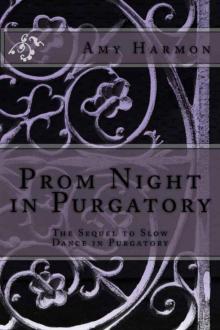 Prom Night in Purgatory
Prom Night in Purgatory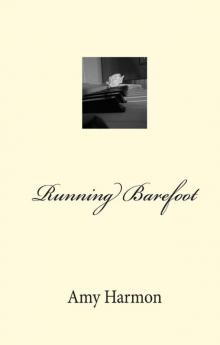 Running Barefoot
Running Barefoot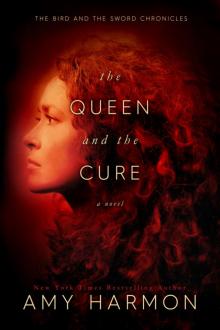 The Queen and the Cure
The Queen and the Cure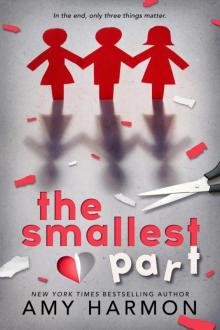 The Smallest Part
The Smallest Part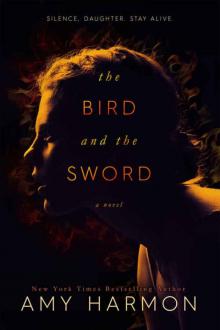 The Bird and the Sword
The Bird and the Sword The Song of David
The Song of David Infinity + One
Infinity + One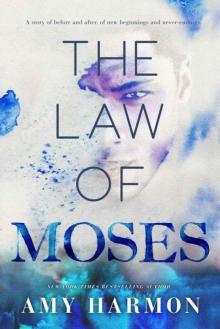 The Law of Moses
The Law of Moses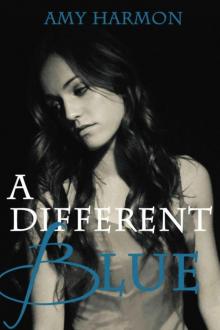 A Different Blue
A Different Blue From Sand and Ash
From Sand and Ash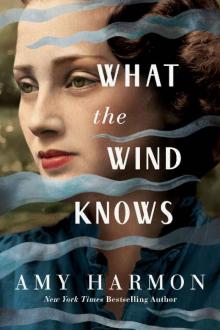 What the Wind Knows
What the Wind Knows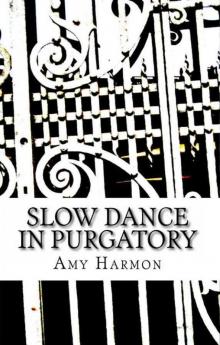 Slow Dance in Purgatory
Slow Dance in Purgatory Romance Through the Ages
Romance Through the Ages